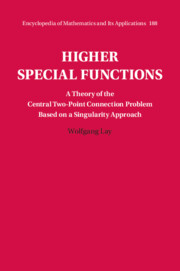 Higher Special Functions
Higher Special Functions Book contents
- Frontmatter
- Dedication
- Contents
- Preface
- Acknowledgements
- 1 Introduction
- 2 Singularities in Action
- 3 Fuchsian Differential Equations: The Cornerstones
- 4 Central Two-Point Connection Problems and Higher Special Functions
- 5 Applications and Examples
- 6 Afterword
- Appendix A Standard Central Two-Point Connection Problem
- Appendix B Curriculum Vitae of George Cecil Jaffé
- References
- Index
4 - Central Two-Point Connection Problems and Higher Special Functions
Published online by Cambridge University Press: 16 May 2024
- Frontmatter
- Dedication
- Contents
- Preface
- Acknowledgements
- 1 Introduction
- 2 Singularities in Action
- 3 Fuchsian Differential Equations: The Cornerstones
- 4 Central Two-Point Connection Problems and Higher Special Functions
- 5 Applications and Examples
- 6 Afterword
- Appendix A Standard Central Two-Point Connection Problem
- Appendix B Curriculum Vitae of George Cecil Jaffé
- References
- Index
Summary
We have a division into classical and higher special functions. The singular boundary eigenvalue problems producing classical special functions are not specifically denoted, while for higher special functions they are called central two-point connection problems (CTCPs). Solving a CTCP means determining the parameters of the underlying differential equation for which a particular solution obeys the singular boundary conditions. The method is developed in detail, and demonstrated for the Heun class. This is the main mathematical part of the book. We see the power of the Jaffé method in generalising such CTCPs. The asymptotic behaviour of the power series and the asymptotic factor is balanced in such a way that the eigenfunction behaviour is apparent when the eigenvalue parameter admits an eigenvalue. This is the ingenious aspect of Jaffé’s ansatz. Although dealing with more fundamental mathematical issues, we fill a certain gap in understanding how the Jaffé approach to the CTCP works when applied to Fuchsian differential equations and their confluent and reduced cases. The considerations are split into the basic concept and the calculatory procedure of carrying it out.
Keywords
Information
- Type
- Chapter
- Information
- Higher Special FunctionsA Theory of the Central Two-Point Connection Problem Based on a Singularity Approach, pp. 157 - 189Publisher: Cambridge University PressPrint publication year: 2024